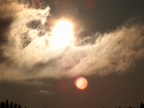by Miriam Hogan, O.C.D.
In Shakespeare’s play Macbeth we have the lines: "When shall we three meet again in thunder, lightning, or in rain?" “When the hurlyburly's done, when the battle's lost and won.”1 Now, one may think what do these particular/peculiar lines have to do with Christmas? Perhaps nothing...but then again, considering the war in Iraq and the sex abuse scandals in the Catholic Church, perhaps they are not as meaningless as they may seem at first glance. Further, hurlyburly may also be a good way to describe the phenomenon of “black Friday” consumerism and the rush to buy gifts, attend parties, cook, clean, contact relatives and friends and decorate for the Holidays. No wonder that we struggle to focus on the meaning of the angels’ message: “Glory to God in the highest, and on earth peace…”Lk 2:14
This reality of Peace may indeed seem distant in the face of all the problems that are unresolved in our Country and in our Church. Struggling to understand our current situation, we may find reassurance in looking back to another era in history. For example, one of our Carmelite Saints, Edith Stein, (aka Saint Teresa Benedicta of the Cross) wrote about looking back in order to confront the present.
Nowadays I always feel transported into Napoleonic times, and I can imagine in what tension people lived then everywhere in Europe. I wonder: will we live to see the events of our days become “history”? I have a great desire to see all this sometime in the light of eternity. For one realizes ever more clearly how blind we are toward everything. One marvels at how mistakenly one viewed a lot of things before, and yet the very next moment one commits the blunder of again forming an opinion without having the necessary basis for it.2
Also, as we look back we can find assurance for our own manner of life in the stories of how in the midst of war and external conflict, life continued in what we would recognize as a very ordinary manner. Some spiritual writers refer to this way of living as responding to the grace of the moment while embracing the obscurity of the future. As I was growing up, my father, a history major, often reminded us to wait to see the truth of a matter in the light of history. On December 25, in 1944, he wrote a letter3 to my mother from a cold and foggy Air Force base in England, describing his Christmas.
After attending midnite Mass I went back to the barracks and had a snack. Some of the boys hadn’t opened their Christmas packages until then and they passed candy and cake around. I dug out some K rations and some saltines I had, and we all managed to get enough to eat. It was 3:30 before we put the lights out.
Later in the same letter he described the beauty of seeing everything covered in frost from the fog when the sun came out in the morning.
Seek The Truth Of The Moment
Now many years after WWII, I find his words both simple and comforting. Humanly speaking we simply do not know how the stories of our own lives are going to develop. Yet, with faith, we can once again let the mystery of truth and goodness touch our hearts in the mystery of the Incarnation as it is given to us in our day. Thus, while we may hear echoes of Shakespeare’s witches crying "Fair is foul, and foul is fair: / Hover through the fog and filthy air" (Macbeth 1.1.11-12), and we may see the images that the advertisement industry would like us to focus on and buy, we can at the same time like Edith seek for the truth of the moment.4Further this truth that we seek today about the mystery of Christmas in our own lives can be known in a deeper fuller way by using literature and the experience of previous times. Recently, Pope Benedict XVI said in a meditation. “This is the way God reigns; this is his plan of salvation, a 'mystery,' in the biblical sense of the term, namely, a plan that is revealed little by little in history.”5
God Is Seeking Us
Finally, we know from spiritual writers like St. John of the Cross that as much as we are seeking God, God is seeking us more. To once again use Shakespeare’s image, it seems that as long as we are human there will be hurlyburlies and that God enters into them and walks with us through them. For, Scripture records that Christ’s birth into our world was also at a time in which there was much political uncertainty and danger. For example, the gospel of Matthew reminds us that a short time after the angels appeared, Herod “gave orders to kill all the boys in Bethlehem and its vicinity who were two years old and under.” (Matt 2:16) Mary and Joseph had to flee into Egypt in order to save the life of the Prince of Peace.
_____
1Macbeth : Act 1, Scene 1
2 http://www.ocd.pcn.net/ed_en.htm
3 This letter was written just a short time after he had returned from being behind enemy lines in Germany .
4Edith who was deeply committed to seeking the truth in all circumstances did not live to see the history that she was so curious about. In 1942 shortly before dying in one of the gas chambers of Auschwitz with her sister Rosa, She stated: “Whatever happens, I am prepared for everything. Jesus is also here with us.” ( Hedwig Konrad Martius, in Relatio et Vita 141.)
5November 26, 2006, Love and Truth Aren’t Imposed on Us, Says Pope “they Knock on the Door of the Heart” http://www.zenit.org/english/
